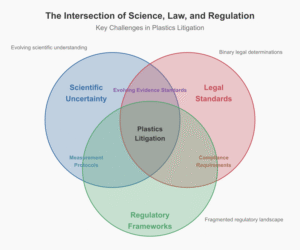
America’s courtrooms have become laboratories for scientific decision-making, but the experiments aren’t going well. Our analysis of 67 plastics cases reveals a troubling pattern: when courts must resolve complex scientific questions without adequate frameworks, the results can vary dramatically—creating two very different Americas depending on how science is handled in litigation.
The Problem: Scientific Inconsistency in Today’s Courtrooms
The surge in plastics litigation—with 28 cases receiving updates in just the past 18 months—has forced judges to make determinations about microplastics safety, recyclability claims, and environmental impacts (Plastics Litigation Tracker, 2025). Yet courts are ill-equipped for this role, lacking standardized scientific review processes and often relying on adversarial expert presentations that obscure rather than illuminate the evidence.
Consider the current landscape: 49% of cases involve false advertising claims, 31% include consumer protection allegations, and 55% cite state code violations. Each case requires judges to evaluate scientific evidence about plastic safety, environmental impact, and technological feasibility—but without consistent standards for what constitutes sufficient proof.
Scenario A: When Flawed Science Drives Decisions
In one America, courts make scientific determinations based on incomplete evidence, advocacy-driven research, and legal standards that don’t align with scientific uncertainty. The Miller v. Handi-Craft case illustrates this dynamic, where allegations about microplastics leaching from baby bottles proceeded despite limited peer-reviewed research on health impacts (Plastics Litigation Tracker, 2025).
This approach creates several cascading problems. Companies face legal liability based on preliminary or disputed science, leading them to abandon potentially beneficial innovations rather than risk litigation. The Baltimore v. PepsiCo case, which seeks damages for plastic pollution cleanup while alleging false recyclability claims, exemplifies how legal theories can outpace scientific consensus.
Market responses become defensive rather than innovative. As documented in Part 3 of our series, litigation uncertainty drives companies to prioritize legal defensibility over environmental improvement. Companies redirect resources from research and development toward legal compliance and defense, creating a system where avoiding litigation takes precedence over advancing sustainable solutions.
Research priorities become distorted as scientists focus on litigation-relevant questions rather than fundamental understanding. Studies designed to support or defend against lawsuits may use methodologies optimized for legal rather than scientific purposes, creating a feedback loop of advocacy-driven research.
Scenario B: The Power of Sound Scientific Standards
An alternative America would handle scientific evidence through more rigorous, consistent processes. Courts would have access to independent scientific review panels with expertise in relevant fields. Legal standards would align with scientific standards of evidence, acknowledging uncertainty where it exists rather than forcing premature conclusions.
In this scenario, the Sierra Club v. Exxon Mobil case—involving allegations about single-use plastic disposal feasibility—would be evaluated against comprehensive scientific assessments rather than competing expert opinions (Plastics Litigation Tracker, 2025). Companies would face clear, science-based standards rather than unpredictable legal theories.
Innovation would be encouraged through safe harbors for companies following established scientific protocols. Rather than defensive strategies aimed at minimizing legal exposure, businesses could invest in research knowing that good-faith efforts based on sound science would receive appropriate legal protection.
Scientific research would maintain its independence, addressing fundamental questions about plastic impacts and solutions without being co-opted by litigation strategies. This would accelerate genuine understanding and more effective interventions.
A Tale of Two Americas: The Stark Contrast
The differences between these approaches compound over time. In Scenario A, the litigation system becomes a de facto science policy-maker, with courthouse victories determining what counts as legitimate research and acceptable risk levels. Scientific uncertainty becomes a legal weapon rather than a call for more research.
Scenario B preserves the integrity of both legal and scientific institutions. Courts focus on their core competency of applying established law to clear facts, while scientific institutions maintain responsibility for evaluating evidence and establishing consensus. Legal precedents reflect scientific understanding rather than litigation strategy.
The economic implications diverge sharply. Scenario A creates massive transaction costs as companies and advocacy groups battle over scientific questions in courtrooms designed for other purposes. Scenario B reduces these costs while channeling resources toward actual solutions.
Where We Stand Today: Warning Signs
Current trends suggest America is drifting toward Scenario A. With 55% of plastics cases filed in federal courts and 22% in California, a small number of judges are effectively setting national science policy through individual rulings (Plastics Litigation Tracker, 2025). These decisions often lack the scientific input necessary for sound conclusions.
The case outcomes reveal the problem’s scope. Of tracked cases, 19% remain pending, 36% have closed, and 18% settled—often without establishing clear scientific principles. This pattern leaves fundamental questions unresolved while consuming enormous resources.
Industry responses increasingly prioritize legal defensibility over scientific merit. Environmental groups focus on winnable cases rather than the most environmentally significant issues. Researchers gravitate toward litigation-relevant topics regardless of their scientific importance.

The Path Forward: Choosing Our Future
The choice between these Americas isn’t predetermined. Courts could demand higher scientific standards before accepting expert testimony. Legal frameworks could be updated to better accommodate scientific uncertainty. Independent scientific advisory panels could provide courts with objective assessments.
Professional scientific societies could establish clearer standards for litigation-related research. Companies could commit to following established scientific protocols rather than purely defensive strategies. Environmental groups could prioritize scientific integrity alongside advocacy goals.
The stakes extend beyond plastics. The precedents being set will influence how courts handle emerging technologies, environmental challenges, and public health issues for decades. If we allow litigation to become the primary mechanism for resolving scientific questions, we risk creating a system that prioritizes legal victories over factual accuracy.
The litigation-driven approach effectively transfers complex scientific decision-making to institutions designed for adversarial fact-finding rather than collaborative knowledge-building. This misalignment between institutional design and task requirements creates inefficiencies that may ultimately undermine both environmental progress and scientific integrity.
The two Americas aren’t just possible futures—they’re emerging realities. The path we choose will determine whether science serves justice or becomes subservient to it.
This concludes our four-part series examining the current landscape of plastics litigation in America. The Center for Truth in Science is committed to promoting evidence-based solutions to complex challenges at the intersection of science, justice, and the economy.
References
Mayor and City Council of Baltimore v. Pepsico, Inc., et al., No. C-24-CV-24-001003 (Cir. Ct. Balt. Cty. filed 2024).
Miller et al. v. Handi-Craft Company Inc., No. 4:24-cv-03782 (N.D. Cal. filed 2024).
Plastics Litigation Tracker. (2025). State Impact Center. https://plasticslitigationtracker.org/ (accessed June 2025).
Sierra Club, Inc. et al. v. Exxon Mobil Corporation et al., No. 3:24-cv-07288 (N.D. Cal. removed 2024).